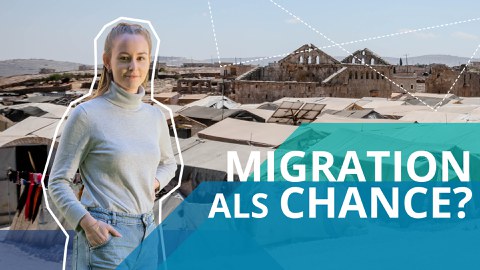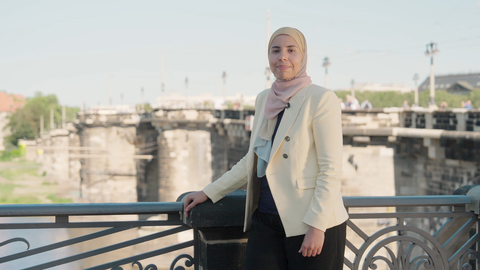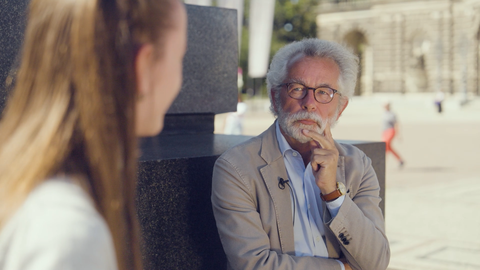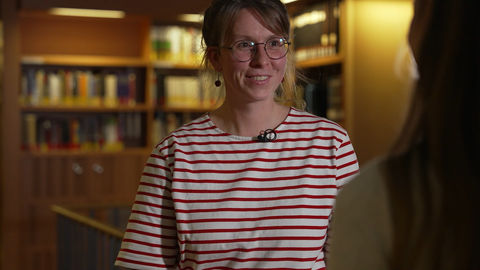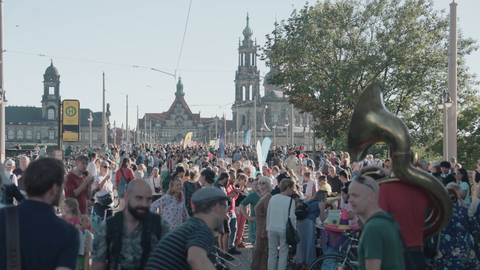Jan 25, 2024
Migration: Huge challenge, huge opportunities?
Public debate on migration often focuses on the problems associated with it. At the same time, however, immigration also offers huge opportunities. At TU Dresden, researchers are looking at the matter from different perspectives: What's the role of migration with regard to the shortage of skilled workers? How does migration affect social polarization? What ethical responsibility does a country like Germany have towards refugees?
Integration is often understood as assimilation, i.e. the one-sided adaptation by refugees to life in Germany. Youmna Fouad regrets this approach and advocates for a concept of integration that gives immigrants the opportunity to be treated as equals and to be on an equal footing. This phenomenon starts with the integration courses, which the sociologist is researching as part of her doctorate.
"It should not be the purpose of integration courses to label refugees as 'different', to confront them with prejudices and to demand that they adapt to the German lifestyle." The problem can already be seen in the course textbooks, explains Youmna Fouad, where migrants are portrayed with disparaging stereotypes. "Real-life content such as dealing with the authorities or writing job applications is far more important than conveying an idealized image of Germany, which is taught in the courses."
In democratic societies, immigration can sometimes lead to conflict. In Dresden, this can be seen impressively in the rise of the far-right PEGIDA movement in 2014. "Migration issues are issues that can significantly divide societies,” says political scientist Professor Hans Vorländer. According to him, the migration crisis has also strengthened right-wing populist parties and increased social polarization.
"Often, the reasons for this development are not that rational," explains the Director of the Mercator Forum Migration and Democracy (MIDEM), adding: "There are a lot of emotions involved." As a result, people may strongly reject other opinions, especially those that advocate cosmopolitanism and diversity. Refugees are perceived as being foreign or even threatening. "These kinds of prejudices are overcome when people meet each other," explains Hans Vorländer. In migration research, this is referred to as the contact hypothesis.
Such contacts can take place at the workplace, for example. In view of the growing shortage of skilled workers, immigration is likely to play a decisive role in this field in the future. "We will lose a good three million workers in the next ten to 15 years," explains Professor Alexander Kemnitz.
"We won't be able to compensate this decline with our own people and those who are yet to come." However, potential immigrants must also be presented with better prospects. The economist does not believe that the current practice of temporary work permits is beneficial. The planned immigration law based on the Canadian model could improve the situation. “The opportunity card will certainly make the system more flexible," Kemnitz predicts. In addition, the fundamental understanding of immigration in parts of the German population needs to change. "In most cases, it's about eliminating shortages in sectors such as care giving and not about taking away jobs."
The topic of migration also raises interesting questions from a philosophical perspective: What duty does a country like Germany have to help refugees? "There is a broad consensus that we have a responsibility," says Lisa Hecht and continues: "The controversial question is just how big it is and how much we have to help."
The philosopher sees two main reasons for this responsibility: A general humanitarian duty to help and a duty to make amends. According to her, the latter applies when a country is responsible for people having to flee their homeland. Lisa Hecht takes a critical view of the distinction between so-called "economic refugees" and refugees entitled to asylum. This begs the question of whether the categories used to assess the need for help are always correct. At the same time, the philosopher explains: "When it comes to taking in refugees, we also have to look at how much a country can cope with. How strong is its integration capacity, how politically stable is a host country?
Migration is a huge challenge for both host countries and immigrants. The opportunities which also result from migration can be improved by offering both better and more real-life integration courses. Migration can only counteract the shortage of skilled workers if immigrants are given realistic prospects. The experts from TU Dresden talk about all these aspects in our latest episode of “Gute Frage” (“Good Question”) on the “TU Dresden entdecken” (Discover TU Dresden) YouTube channel.
© TU Dresden
Contacts:
Prof. Hans Vorländer
Mercator Forum Migration and Democracy (MIDEM)

